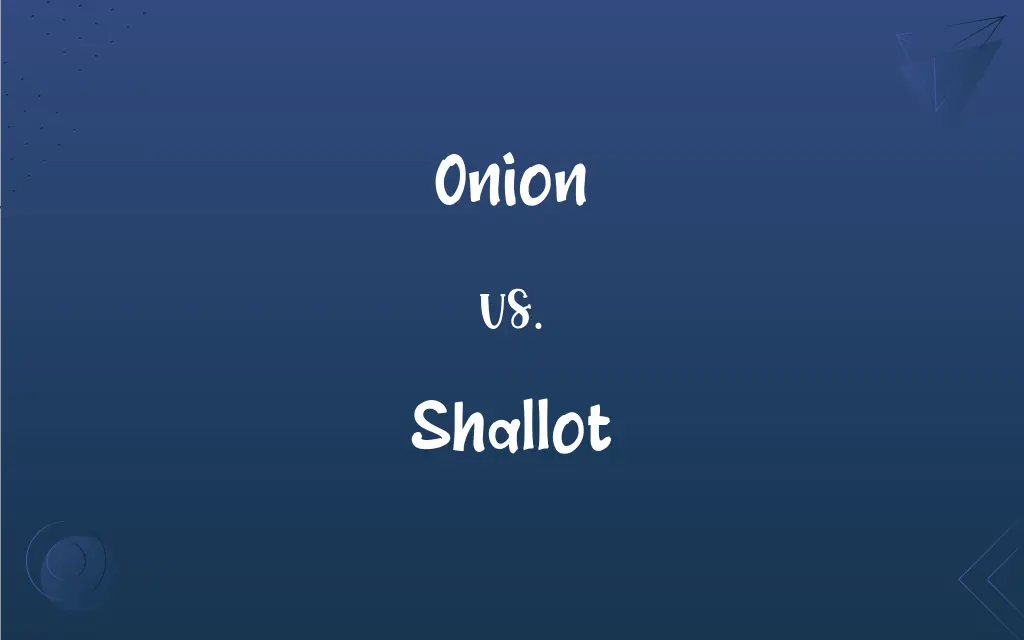Onion vs. Shallot: What's the Difference?
Edited by Aimie Carlson || By Harlon Moss || Updated on June 26, 2024
Onion is a bulbous plant with pungent, edible bulbs. Shallot is a small bulbous plant resembling an onion but with a milder flavor.

Key Differences
An onion is a widely used culinary vegetable, notable for its pungent aroma and versatile application in various dishes. Conversely, a shallot, while bearing similarities to an onion, brings a more delicate, slightly sweet, and less astringent flavor to culinary applications, making it favorable in different culinary contexts.
The onion is characterized by its larger, rounder, and often pungent bulbs, which can be white, yellow, or red. The shallot, presenting a more tapered shape, typically demonstrates a subtle flavor, and its bulbs, which are usually smaller and elongated, often feature a purple or golden skin.
In culinary use, onions are famed for providing a strong, robust flavor and are utilized in an extensive array of dishes, from raw salads to deeply caramelized culinary creations. Shallots, being mellower and less assertive, find usage in dishes that demand a gentle onion-like presence, such as vinaigrettes or lightly sautéed preparations.
When observing the growth and division of bulbs, onions generally form a single bulb per plant. In contrast, shallots often form clusters of bulbs, developing into a connected grouping under the soil, which distinguishes their growth pattern noticeably from onions.
The storage of onions usually demands a cool, dark, and well-ventilated space to preserve their longevity. Shallots, while also benefiting from a similar storage environment, may exhibit a slightly shorter storage life compared to onions, necessitating timely usage to harness their fresh, delicate flavor.
ADVERTISEMENT
Comparison Chart
Size & Shape
Larger, round bulbs
Smaller, elongated bulbs often in clusters
Flavor Profile
Pungent and robust flavor
Milder, slightly sweet, and subtle flavor
Culinary Use
Extensive use in various dishes
Prefers in delicate or light dishes
Bulb Division
Typically form a single bulb
Form clusters of bulbs
Storage Life
Generally, long-lasting when stored properly
May have a slightly shorter storage life
ADVERTISEMENT
Onion and Shallot Definitions
Onion
An onion is a pungent vegetable used worldwide.
I chopped an onion to add to the stir-fry.
Shallot
A shallot offers a mild and subtle flavor.
The sauce required two finely diced shallots.
Onion
Onions are rich in vitamins and minerals.
Including onion in the diet can provide nutritional benefits.
Shallot
Shallots often form clusters of bulbs.
I separated the shallot into individual bulbs before planting.
Onion
Onions may cause eyes to water when chopped.
She teared up while cutting the onion.
Shallot
Shallots are favored for their gentle taste.
She used a shallot to avoid overpowering the dish.
Onion
Onions are utilized in various cooking methods.
The onion caramelized beautifully in the hot pan.
Shallot
Shallots can be eaten raw or cooked.
He added raw shallot to the salad for a gentle bite.
Onion
Onions can be white, red, or yellow.
The recipe calls for a large yellow onion.
Shallot
Shallots are utilized in various cuisines worldwide.
The shallot provided a mild, sweet base for the curry.
Onion
A bulbous plant (Allium cepa) cultivated worldwide as a vegetable.
FAQs
Can onions and shallots be used interchangeably in recipes?
While they can be swapped in some recipes, it's important to adjust for their different flavor intensities.
Can I substitute onions for shallots in raw dishes?
Yes, but be mindful that onions have a stronger flavor than shallots and might dominate the dish.
Is there a significant nutritional difference between onions and shallots?
Both are nutritious but shallots have more antioxidants and are higher in fat and calories than onions, while onions have more fiber.
Why do recipes sometimes prefer shallots over onions?
Shallots are often preferred for their milder and slightly sweeter flavor, which can be desirable in certain dishes.
Can I use shallots in place of onions for caramelizing?
Yes, shallots can be caramelized similarly to onions but they may cook more quickly due to their smaller size and higher sugar content.
Are green onions and shallots the same?
No, green onions (or scallions) and shallots are different, both in appearance and flavor.
Is it possible to grow shallots and onions at home?
Absolutely, both shallots and onions can be grown at home, with appropriate care and suitable conditions.
Why do onions sometimes color dishes more than shallots?
Onions, especially red varieties, have pigments that may leach into dishes, slightly altering their color.
Why do onions tend to be cheaper than shallots?
Onions are more widely produced and harvested mechanically, whereas shallots are often harvested by hand, contributing to the cost difference.
Is there a way to prevent tears while chopping onions, and does this apply to shallots as well?
Chilling onions before chopping and using a sharp knife can minimize tears. Shallots can also cause tearing but may be milder.
Can onions and shallots cause allergic reactions?
Allergies to onions and shallots are rare but not impossible, and symptoms might include itching, swelling, and redness.
Can the skins of onions and shallots be used in cooking?
Onion and shallot skins are typically not consumed but can be used to make broths and dyes due to their color and nutrients.
Are shallots and onions safe for pets to consume?
No, both shallots and onions are toxic to pets like dogs and cats and should be kept away from them.
Can onions be substituted for shallots in pickling?
Yes, but the flavor profile will change due to the stronger, more pungent nature of onions.
Can both onions and shallots be stored in the same way?
Yes, both should be stored in a cool, dry, dark place, but shallots may have a slightly shorter shelf life.
Can you eat the green shoots that grow from old onions and shallots?
Yes, the green shoots from both onions and shallots are edible and can be used similarly to green onions.
Can onions and shallots be frozen for later use?
Yes, both onions and shallots can be frozen, but it’s advisable to chop them first and expect a change in texture upon thawing.
How does cooking affect the flavor of onions and shallots?
Cooking mellows the pungent flavor of onions and shallots, often making them sweeter, especially when caramelized.
How long does it take for onions and shallots to grow?
On average, onions and shallots take about 3-4 months to mature from seeding, depending on the variety and conditions.
Are there different varieties of shallots, like there are onions?
Yes, there are various shallot varieties, each with its own unique size, shape, and flavor.
About Author
Written by
Harlon MossHarlon is a seasoned quality moderator and accomplished content writer for Difference Wiki. An alumnus of the prestigious University of California, he earned his degree in Computer Science. Leveraging his academic background, Harlon brings a meticulous and informed perspective to his work, ensuring content accuracy and excellence.
Edited by
Aimie CarlsonAimie Carlson, holding a master's degree in English literature, is a fervent English language enthusiast. She lends her writing talents to Difference Wiki, a prominent website that specializes in comparisons, offering readers insightful analyses that both captivate and inform.































































